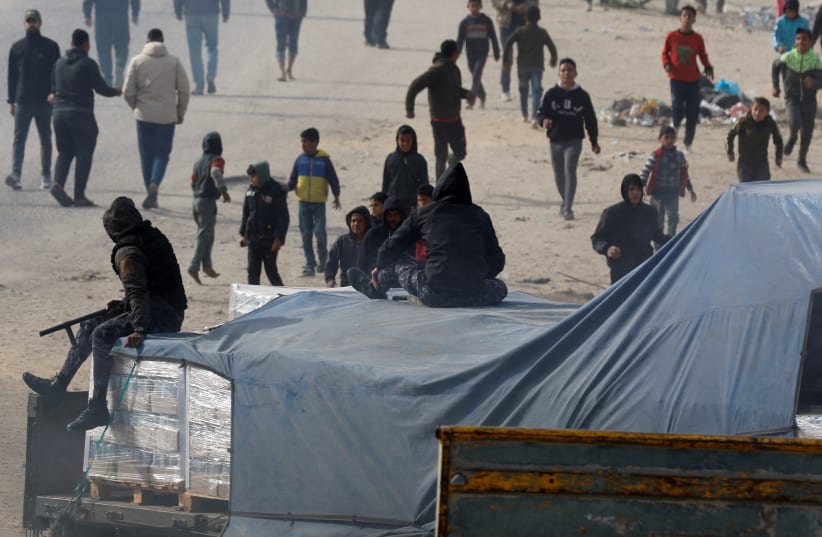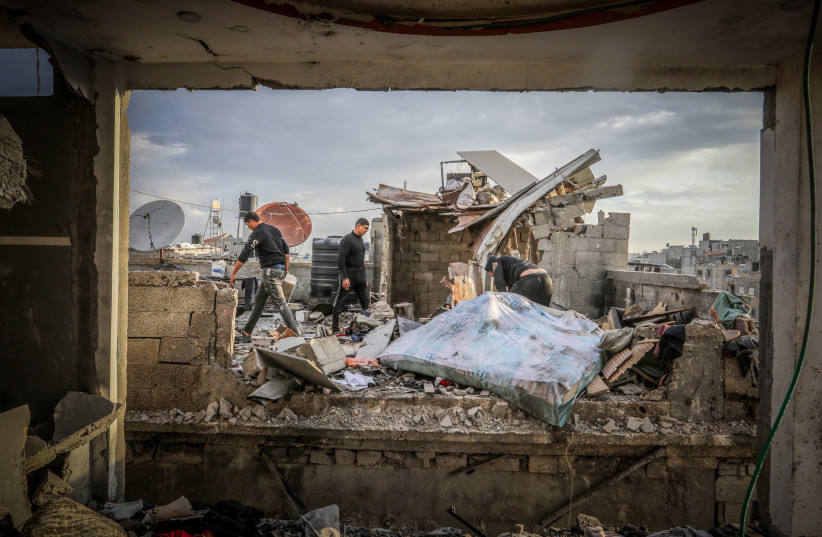by Seth J. Frantzman
Currently, Hamas controls the area along the Egyptian border, and this remains one of the last Hamas strongholds in Gaza.
 |
Two articles at the pro-Iranian al-Mayadeen media point to growing concern among Iran and its proxies about potential Israeli operations around Rafah and the Egyptian border – the Philadelphi Corridor.
The corridor, 14km. in length, has been in the spotlight recently because of reports that Israel could operate thereafter operations in Khan Yunis against Hamas. Currently, Hamas controls the area along the Egyptian border, which remains one of the last Hamas strongholds in Gaza.
The first al-Mayadeen article, from Sunday, reads: “Egypt informed Palestinian factions of its decision to prevent the occupation (Israel) from invading the Rafah borders.”
The second article, from Tuesday, highlighted an Egyptian military parade and warned about the Philadelphi route. “Israeli officials and occupation media made many statements about the necessity of placing this axis under Israeli control. The campaign was prepared and directed, and it even reached the rabbis,” it reported.
Of note is less the reports themselves, and more the fact that they exist, the increased focus by Al-Mayadeen on the issue. In general, this media network publishes numerous articles every day heralding the “success” of Hezbollah and Hamas. Each comes with new claims of how Hamas “confronts the occupation” and how Hezbollah targeted a site on the Israeli border.
Sometimes the articles are pure propaganda, while at others they reflect actual claims by the terrorist groups and provide insight into the strategy and tactics of Hezbollah and Hamas. For instance, when an article highlights new Hezbollah weapons, it is often important to pay attention because it illustrates how Hezbollah may be shifting resources and tactics.


Therefore, the focus on Philadelphi is a new theme by the media and reflects a concern by Hamas, Hezbollah, and perhaps even by Iran itself. The Tuesday report accuses Prime Minister Benjamin Netanyahu of seeking to “proceed with the plan to control the narrow border strip” due to “failure” in other parts of Gaza.
This is precisely the Hamas narrative, which was confirmed in a recent document found in Gaza and reported by N12’s news site on Monday. According to the document, Hamas is purposely trying to portray Israel as having “failed” in operations over the last several months. The truth is that Israel has been successful, and half of Hamas’ terrorists have been either eliminated or wounded.
What is noteworthy is that al-Mayadeen is now openly repeating the narrative that Hamas recorded days or months ago in Gaza, now using this narrative to “explain” the claims of Israeli focus on the Philadelphi route. The report focuses on discussions in Israeli media about this issue as well: “The city of Rafah must be seized,” the report cites Maariv as saying. The article then discusses other theories about Israeli initiatives and mentions Somalia and Ethiopia. It appears that the Iranian narrative is trying to use reports like this to inflame tensions with Egypt or create controversies.
Unclear what will come next, but Iran may try to inflame
The report concludes with discussions about how Hamas welcomed Israel’s opposition to its operations along the corridor and quotes from an Egyptian researcher who asserted that the operation in Rafah will not go well. The last part of the report says that Egypt has recently spotlighted a review of its 4th Division, in light of reports about tensions along the border. It wasn’t immediately clear what this was a reference to, as Egyptian media had not appeared to highlight this military unit in the last day.
However, the Egyptian Independent did run a report noting that “the Chairman of the Defense and National Security Committee in the Egyptian House of Representatives, Ahmed al-Awady, affirmed Egypt’s support for any decisions and measures taken by President Abdel Fattah el-Sisi in defense of Palestine, and spoke of Egypt’s increasingly strained relations with Israel.”
The report noted that “Egyptian-Israeli relations are going through their most difficult stage in their history, [Awady] warned, as a result of Israel’s brutal aggression in the Gaza Strip.”
It went on to say that “Awady slammed Netanyahu’s statements about Israel’s inability to end its war against Hamas until the closure of Philadelphi Corridor along the border between Egypt and Gaza as provocative and obstructive to the efforts Egypt has made to save the lives of children, women and the injured in the Gaza Strip.”
It remains to be seen what will come next in terms of the Philadelphi issue. Pro-Iran media may continue to try to inflame this issue. However, Egyptian media and other media in the region may also shift focus to Rafah and the corridor.
Seth J. Frantzman
Source: https://www.jpost.com/israel-hamas-war/article-784326
No comments:
Post a Comment